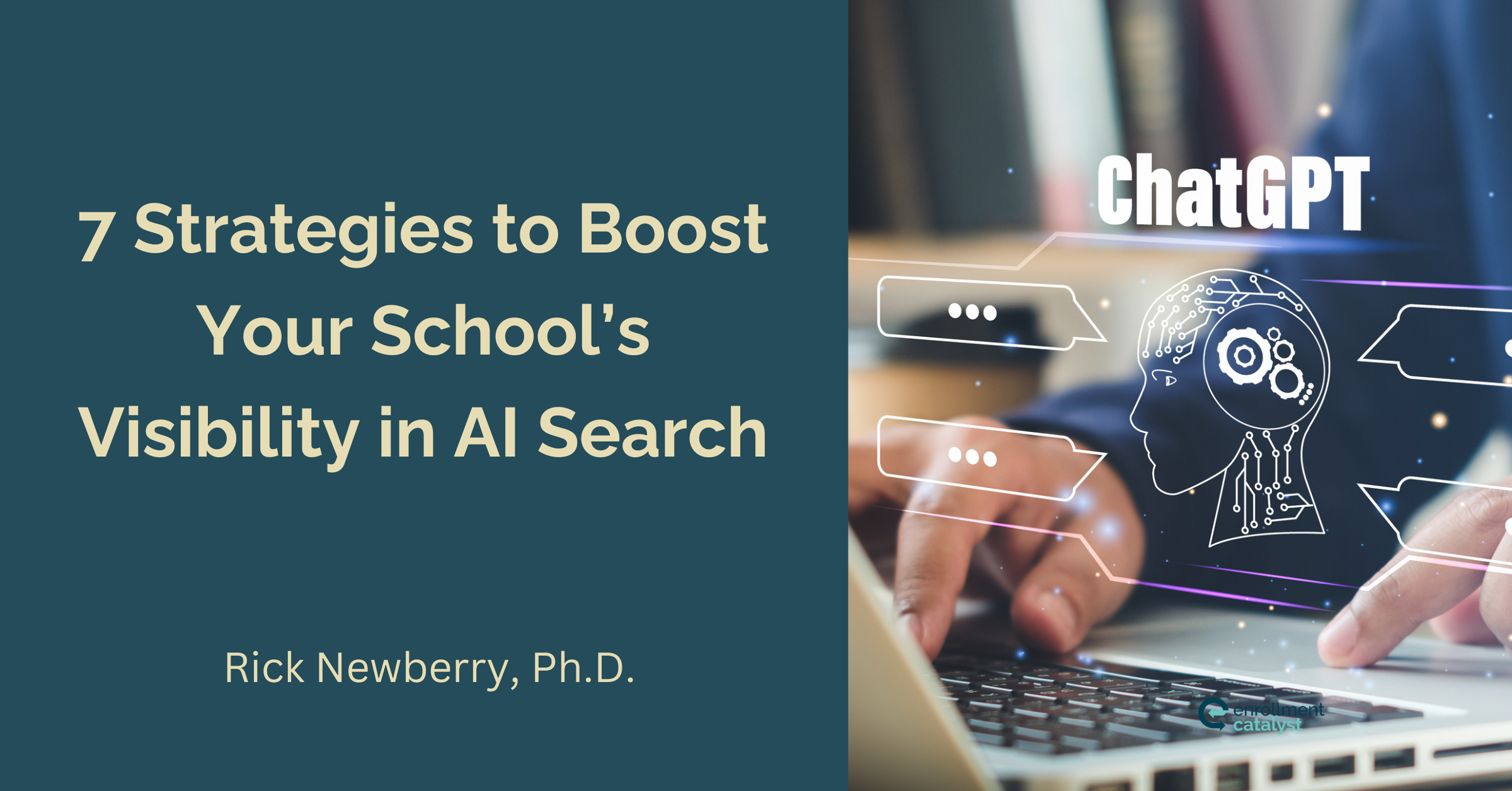 In Part 1 of this series, I explored how prospective parents are shifting from Google searches to AI tools like ChatGPT, Perplexity, and Google Gemini to research schools. Instead of scrolling through pages of search results, they’re asking direct questions and receiving instant, summarized answers.
In Part 1 of this series, I explored how prospective parents are shifting from Google searches to AI tools like ChatGPT, Perplexity, and Google Gemini to research schools. Instead of scrolling through pages of search results, they’re asking direct questions and receiving instant, summarized answers.
This shift is both a challenge and an opportunity. It means your school is no longer just competing for rankings on a search engine results page. You’re competing for inclusion in an AI-generated narrative, and the quality of that narrative can determine whether families find and trust your school.
The question for every school leader is: When parents ask AI about the best schools in your area, will you be mentioned, and will the story be accurate and compelling?
Here are 7 practical strategies to help you show up and stand out in AI search.
1. Ask ChatGPT About Your School
This is the simplest first step. Open ChatGPT (or another AI tool) and ask:
- “Tell me about [Your School Name] in [City, State].”
- “What are the top private schools in [City, State]?”
Are you listed? If so, how are you described? Is the tone positive and accurate, or missing key elements of your story? This exercise reveals how an AI tool “understands” your school based on publicly available information.
2. Strengthen Your Website for AI Readability
AI tools pull heavily from website content. If your site’s language is vague, internally focused, or lacking detail, the AI’s summary will be just as weak. Your site should clearly answer:
- Who you are and what you stand for
- Why families choose you
- Your academic, extracurricular, and core distinctives
- The type of students and families you serve
Think like a prospective parent. Anticipate their questions and write content that answers them directly.
3. Publish Blog Content That Mirrors Parent Questions
Consistent, high-quality blog posts do more than help your Google rankings; they give AI more accurate, relevant content to pull from when generating answers.
Examples of blog topics AI might reference:
- “Why Families Choose a Private School in [Your City]”
- “How [School Name] Prepares Students for College and Life”
- “Top 5 Reasons Parents Love [School Name]”
If you’re not regularly publishing a blog, you’re missing an opportunity to shape your digital narrative.
4. Manage Your Online Reviews and Listings
AI often references public review sites, including:
- Niche
- GreatSchools
- Private School Review
Strong, authentic, and current reviews improve both your reputation and your likelihood of being included in AI’s recommendations. Encourage happy families to share their experiences and make sure your school’s profiles are up to date and consistent.
Also, it is crucial to review sites like Wikipedia to make sure your school’s information and story is up to date, since AI will often pull from any authoritative sites online.
5. Keep Your Messaging Consistent Everywhere
Your website, social media, and directory listings should all tell the same story. If your mission statement, tagline, or program descriptions vary, AI may pick up conflicting information or leave out key details altogether.
6. Add Structured Data (Schema Markup) to Your Website
Technical? Yes. Essential? Absolutely. Schema markup is code that helps search engines and AI tools understand your content more clearly. With schema, you can highlight:
- Academic programs
- Athletics, arts, and extracurriculars
- Parent testimonials
- Tuition and admissions details
This “behind-the-scenes” structure makes it easier for AI to pull accurate, detailed answers about your school.
7. Create FAQs and Audit AI Responses Regularly
Parents ask AI in natural language—and FAQs are the perfect way to supply those answers directly. Build an FAQ page with questions like:
- “Does [School Name] offer financial aid?”
- “What grade levels does [School Name] serve?”
- “What makes [School Name] different from other schools in [City]?”
- “What is the average class size at [School Name]?”
- “What extracurricular or athletic opportunities are available?”
- “How does [School Name] integrate faith into academics and student life?”
- “What is the admissions process and timeline?”
- “What is the tuition range, and is financial aid available?”
- “How does [School Name] prepare students for college and beyond?”
Start with the top five questions you hear most often during tours, phone calls, and open houses. These reflect the real concerns of parents and will shape how AI summarizes your school.
Then, schedule quarterly audits where you ask AI the same questions parents ask. Track changes and update your site content when you see gaps or inaccuracies.
Expert Framework + Trusted Partner
These seven strategies form the foundation of what I call an AI-Ready Enrollment Strategy. By implementing them, you’ll strengthen your visibility and control the narrative AI shares about your school.
For schools that want to accelerate this process, I recommend Tassel Marketing’s AI-SEO®. They help you:
- Organize and optimize your website so AI tools can easily find and understand your content
- Create a “knowledge base” for AI to reference when answering parent questions
- Ensure your school is represented accurately and positively in AI-generated responses
I’ve seen Tassel’s work firsthand, and they’re a trusted partner who builds on the foundation I outline here.
Learn more about Tassel’s AI-SEO® solutions.
Final Thought
AI tools are changing how parents find schools and the answers they seek. The best way to prepare is to make sure the information they find about you is accurate, compelling, and easy to access. These seven strategies give you both the foundation and advanced tools to strengthen your visibility.
Reflection Prompt: If you asked ChatGPT about your school today, would the answer tell the story you want parents to hear?
